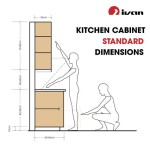How Often Should Kitchen Cabinets Be Replaced?
Kitchen cabinets are an essential part of any kitchen. They provide storage space for cookware, dishes, and other kitchen essentials. They also play a major role in the overall design of the kitchen. However, kitchen cabinets can deteriorate over time, especially if they are not properly maintained. So, how often should kitchen cabinets be replaced?
There is no definitive answer to this question, as the lifespan of kitchen cabinets can vary depending on a number of factors, including the quality of the materials used, the amount of use they get, and how well they are maintained. However, most experts agree that kitchen cabinets should be replaced every 10 to 15 years.
Here are some signs that it may be time to replace your kitchen cabinets:
- The cabinets are starting to show signs of wear and tear, such as peeling paint, chipped laminate, or cracked wood.
- The cabinets are no longer functional, such as drawers that stick or doors that don't close properly.
- The cabinets are outdated and no longer match the style of the kitchen.
- The kitchen is being remodeled and the cabinets need to be replaced to match the new design.
If you are considering replacing your kitchen cabinets, there are a few things to keep in mind. First, you need to decide what type of cabinets you want. There are many different styles and materials to choose from, so you can find cabinets that fit your taste and budget. Second, you need to find a qualified contractor to install the cabinets. Installing kitchen cabinets is a complex process, so it is important to hire someone who knows what they are doing.
Replacing kitchen cabinets can be a big investment, but it can also be a great way to update the look of your kitchen. If you are considering replacing your kitchen cabinets, be sure to do your research and find a qualified contractor. With proper care and maintenance, your new kitchen cabinets can last for many years to come.
Additional Tips for Extending the Lifespan of Kitchen Cabinets
In addition to replacing your kitchen cabinets every 10 to 15 years, there are a few things you can do to extend their lifespan. Here are a few tips:
- Clean your cabinets regularly. Use a mild soap and water solution to wipe down the cabinets and remove any dirt or debris. Be sure to dry the cabinets thoroughly after cleaning.
- Avoid using harsh chemicals or cleaners on your cabinets. These chemicals can damage the finish of the cabinets.
- Do not overload your cabinets. Overloading the cabinets can put stress on the hinges and drawers, causing them to break.
- Store heavy items in the lower cabinets. This will help to prevent the cabinets from sagging.
- Avoid placing hot items directly on the cabinets. The heat can damage the finish of the cabinets.
By following these tips, you can help to extend the lifespan of your kitchen cabinets and keep them looking their best for years to come.

How Often Should You Renovate Your Kitchen Madera Cabinets

When Should You Replace Your Kitchen Cabinets Direct

How Often Do You Need To Replace Kitchen Cabinets

When Should You Replace Your Kitchen Cabinets Tops Cabinet

Replace Kitchen Cabinets When Is The Best Time

Is It Time To Replace Your Kitchen Cabinets The Creative Co

When To Replace Your Kitchen Cabinets Standard Companies

When Should I Replace Kitchen Cabinets Bath By Design

5 Ways To Tell If Your Cabinets Need Be Replaced Instead Of Refaced

Understanding The Lifespan Of Kitchen Cabinets When To Replace Ross S Discount Home Centre
Related Posts








